#nidah
Explore tagged Tumblr posts
Text

Fallen London Travel Guide:
Nidah
No man shall live a thousand years.
#fallen london#fl travel guide#fallen london travel guide#my post#nidah#presbyterate#elder continent
15 notes
·
View notes
Text
Sex in an Orthodox Jewish Caregiver/Dependent Marriage
This is an essay I wrote years ago as an adjunct to a larger essay on making a caregiver/dependent marriage work. It's based on my and DH's experience as well as some outside advice, and addresses something important for those of us Orthodox Jewish spoonies whose spouses are as much caregiver as lover. I haven't seen the issue of nidah and chronic illness/disability discussed much anywhere, so I'm sharing this here as I originally wrote it in the hope that someone else can benefit from it. It's long and a little spicy, but not so spicy that I feel like I need to tag it as mature.
I want to discuss something critical to any marriage which can be especially difficult in a caregiver/dependent marriage: sex. Yes, I know it’s uncomfortable to talk about, especially when you’ve been raised never to discuss such things. However, the very practice of taharat hamishpachah is essentially centered around sex, and ignoring or glossing over issues in the bedroom won’t make them go away. So, let’s get to it.
First off, lower your expectations for mikvah night. Ladies, if your husband had to drive you to the mikvah and wait somewhere near enough for you to find his car easily but far enough away that it wouldn't be creepy to other ladies using the mikvah, it's hard for him to feel like reconnecting and pampering you more than usual, even if that's what you want. If he's exhausted from taking care of you or he's the one who's chronically ill, sex may not be on the table. Gentlemen, if your wife is chronically ill and finds mikvah prep exhausting or you're chronically ill and she spent all day taking care of you before she even started prepping for mikvah, she may not be interested in sex. Just cuddle in each other's arms for a while and call it a night. All of that goes double if one of you has a condition which makes sex physically uncomfortable and/or difficult.
While we’re talking about mikvah, let’s talk about nidah. If the wife has a gynecological problem that makes her bleed endlessly and/or ridiculously frequently, you may be sexually frustrated for weeks on end. Ladies, I don't care if you've been nidah for four weeks and now you expect a real period again in two days; for the love of everything holy, if you’ve counted 7 clean days then go to mikvah and spend some time reconnecting with your husband. It's worth it, and your body might surprise you and not bleed again for a week. Unless one of you is asexual, you both need sex and touch and reconnection. However you practice nidah, even if it's just stopping sex and nothing else, you'll be frustrated and your stupid little fights won't get resolved as well as you'd like because you won't be able to have makeup sex. If you don't touch each other during nidah and you’re stuck with nidah for too long, you may find yourselves showing signs of clinical depression; humans need touch to thrive. I find that in that kind of situation, getting all the hugs you can from relatives and same-sex friends really helps. It's not the same as your spouse's touch, but it'll at least help keep you functional.
Something else to consider during nidah and in general: communication. Since you can't just have makeup sex or depending how you practice even hug it out, the best thing you can possibly do for yourselves is learn to communicate your feelings and needs in nice, constructive ways. You want to use "I statements" and be upfront but polite with each other if you're upset about something. Think about how you'd respond to "I'm annoyed that I keep having to wash four bowls when I only used one that day. Could you please try to either wash what you use or use fewer dishes?" as opposed to "Stop using so many dishes! You keep using three bowls to my one, and I hate having to wash them all." Your marriage in general will benefit as you get better at communicating, but it's especially vital if the wife is endlessly nidah.
Now we come to the real meat of it: the sex itself. Yes, it’s an awkward thing to negotiate, especially when you’re not used to it. First a caveat, that if you’re unsure if a sexual act you want is permitted, ask your rabbi. Once you’ve done that (if necessary), then in general, try to meet each other halfway in the bedroom. Unless one of you is asexual, you probably both have sexual needs. These can be difficult to meet when one of you is chronically ill. Understand that sometimes one of you will be too tired and/or ill to put out when the other wants sex, and neither of you should take issue with the horny one masturbating under those circumstances. If one of you is not up for penetrative sex but still wants to meet the other's needs, you can always use your hands and/or mouths. Another thing to remember is that you don't both need to have an orgasm every time you do something sexual; sometimes it's purely about satisfying one partner, and the other partner will get theirs another time.
Turning the awkward factor up yet another notch, I recognize that some of you folks out there are into something kinky, or will suddenly discover a kink down the line. If you're kinky, realize that kinky sex probably won't be a regular thing, and figure out ways to work around any disabilities that would make practicing your kink difficult. You might have to do some research, experiment, and perhaps invest a bit more money than you’d planned to, but you will probably be able to find a way to at least make your kink an occasional treat without causing each other undue physical or emotional pain. Communication is key here too – if something doesn’t feel good physically or emotionally, whichever of you is uncomfortable needs to speak up immediately so you can stop, talk it out, and try something else.
In short, though sex and nidah are difficult topics to discuss, they are vital to a happy marriage. I hope you two find your way, whatever it looks like, and have fun for as long as you live.
#jdaim#jumblr#marriage#marriage advice#jewish marriage#jewish marriage advice#spoonie#chronic illness#jewish disabilities acceptance awareness inclusion month#sex advice#nidah#judaism#orthodox judaism
11 notes
·
View notes
Text
Some over reading for fun:

In my HEART of HEARTS, the line "The gifts Nidah gave the First" is notable. Okay look. Look.
Nidah is where the College of Mortality is, it's the seat of the Prester, it's on top of the Mountain of Light. Does the Prester typically give fallen cities gifts? I think this is the first and only time, when the First was new. They aren't that sociable to those outside the EC
Maybe when the Second arrived they went "look we gave a gift to the LAST city from the surface" and decided not to, and never again. But hear me out. Maybe. Maybe. Maybe instead of gifts from Nidah to the First, this was gifts from the Mountain to the Bazaar. And it was only one off because it was never about which city, it was about saying hi to mom
Okay thank you
#spoilers#yeah im always looking for any hint of wtf their relationship is like#you have heard me beg before : BAZ YOUR DAUGHTER IS RIGHT THERE DO YOU EVER TALK TO HER!!!#the fact it is Nidah giving the gift — i guess then it is city giving to city in theory#but interesting distinction from the prester or Presbyteriate
7 notes
·
View notes
Text


The Manager doing The Seven Against Nidah quest but without the other six...
Presbyterate, then: there's some weird man at your gates and he's coming to get you no matter what
London, now: there's some weird man at your door and he's coming to get you no matter what
#fallen london#failbetter games#sunless sea#manager of the royal bethlehem hotel#the calendar council#seven against nidah
39 notes
·
View notes
Text
Queer Converts at Chabad?
It's more likely than you think.
I'm putting this together because as someone whose practice tends more "traditional" (for lack of a better term), and someone who is very obviously Queer, I have found myself relying on Chabad every now and again, and have some tips for how to interact with the organization with minimal stress. Hope this helps someone.
For those who don't know, Chabad is the "missionary"* branch of Chasidic Judaism, an ultra-Orthadox Jewish community which holds some of the most bigoted beliefs you'll find in Judaism. At the same time, Chabadniks are some of the nicest people that you'll ever meet.
My first experience with Chabad, I had just started learning about Judaism in college and had very little context about the wider Jewish community. During Sukkot I happened upon the local Chabad's sukkah in the middle of campus, and decided to pop in. They were holding a learning session about the meaning of the Lulav, and through a line of questioning I learned for the first time about Family Purity (Nidah) laws, and I piped up, "What if you're gay?" To which the Chabad Rabbi kinda stumbled over his words and said, "Well, simply put, you can't be gay." or something to that affect. I said, "Oh, ok." very calmly, realizing what I had walked into, thanked him for the Pizza, and respectfully left.
I've also had some good experiences with Chabad. There's a local Jewish festival in my town every year, and the last time I went I visited both of the Chabad booths (one for the university, and one for the general town). I can't remember which, but one Rabbi wrapped tefillin for me, while the other Rabbi only offered to the cis men who walked up after me. I found myself surprised, but glad to fulfill the mitzvah, and we had a brief conversation about Jewish practice and being true to oneself. His words were very measured, but were neutral, not antagonistic.
This is just to give you a bit of context of what you may deal with at a Chabad house.
Today, on the last(ish) day of Sukkot, I needed to go shake a Lulav and eat in a Sukkah. I couldn't build my own Sukkah this year due to my health, and had also been unable to plan ahead to register for any local events. As someone who has struggled to connect with my local Jewish community becuase it's very spread out vs. where I converted, I don't have any connections with local Jews who may have their own Sukkahs. Hence, I turned to the last possibility, the everpresent Chabad.
I googled around and found the closest Chabad house, found an email form, and sent a quick email inquiring about stopping by to use the Sukkah. I also had a back-up house closer to the liberal bubble I grew up in where Chabadniks are more likely to keep their homophobia on the DL, but I couldn't find an email for them, so I was gonna call the next morning. However, I received an email respose right away and quickly was able to set up a time for me to visit their Sukkah.
Fast forward to today. The Rabbi was very pleasant and I was able to observe the mitzvot of the lulav and dwelling in the Sukkah, so mission accomplished. I had planned on what to say regarding my queerness - "Yeah, I live around here, I just tend not to fit in to many local congregations." which went fine. What I was not anticipating was the very pointed questions to determine how Jewish I was.
I had been thinking about what I would say about this after seeing this post from @vaspider. So I hit him with the "I started practicing in college where the Jewish community was really close together." We walked around it for a bit but he was practiced and ended up eventually hitting me with the "Are your parents Jewish?" then asked me where I converted. While I have little love for Chabad, I didn't feel comfortable lying to him, so I let him know that I converted with the conservative shul where I lived at the time.
The reason he was asking me such pointed questions is because he was trying to determine how much effort it would take to work me into the Chassidic community. If I were born Jewish, he would just need to convince me to strengthen my traditional practice and be a nice heterosexual woman. As a convert in another denomination**, he would need me to convert again with a Chasidic Rabbi before I could be fully incorporated into his shul.
Luckily, I was somewhat prepared for this possibility, so I wasn't taken totally by surprise. And I didn't really feel insulted - I know he subscribes to a very specific idea of the world that is fueling his actions.
I was also very consious to not offer my hand to shake, and he didn't offer his. A lot of Orthodox people observe a practice of not touching people of the "opposite" sex, and I didn't want to extend my hand only for him to refuse it. I wasn't trying to be stealth, but have a full beard, and wasn't sure where he would land on that.
At least after all of that he still had me shake the Lulav and gave me some noodle kugel to eat in the Sukkah. That's all that I wanted.
TLDR: Chabad has the reputation it does for a reason, but if you go in with a very specific purpose and knowing what to expect, they can be a valuable resource. They want you to fulfill the mitvot, so if you can put up with a bit of awkwardness and proseltyzing, it may be worth it to you. Of course, it may not be, this is just to provide some info for other Queer Disabled Jews who find themselves in need of a Jewish space in a pinch.
Edit: I told my Rabbi (who hates Chabad) about this and basically summed it up as, "I feel like a carry a little of your spirit every time I interact with Chabad, because I think I'm fueled out of spite. Like, 'I'm going to fulfill these mitzvot, even if you don't want me to.'" and he loved that. My Rabbi is the best.
If spite is what gets you there, use what works lol.
*I'm calling them missionaries because that's the closest term I could think of, however their goal is not to make non-Jewish people Jewish (that's prohibited), their goal is to make already Jewish people more Orthodox. Not that they'd turn away someone trying to convert.
**Jewish groups that vary by practice are more commonly referred to as "movements" as at the end of the day a Jew is a Jew so even different movements will respect eachother, but of course there's always exceptions and I just didn't want to use the word "movement" over and over again, so denomination seemed like a sufficient synonym.
#i know there are way too many run on sentences#but i'm done editing this#i hope it's readable enough#jumblr#chabad#queer jews#trans jews
32 notes
·
View notes
Text
tangentially related i found out someone has a jewish vampire book titled Nidah. im like ha. i see what you did there
help. why is described like this adfgkhlhljlk

like a lox platter at a Bar Mitzvah
this is killing me
8 notes
·
View notes
Note
11, 12, 39?
11. In what situation Morgan was the most afraid in?
Two moments stand out. When they first returned to London after the War against Nidah. The scars and pains from the war and the desperate escape, clawing inch by inch their way out the garden, were starting to fade but still very visible. They docked at Wolfstack and painfully, hesitant on legs that had been broken and healed more than a couple of time, made their way to The Blind Helmsman. They picked up a tabloid and read the date on it.
The Mountain stole ten years from them and they didn't realize until that very moment.
Of course the second time is when Lilac took a month from them. When they traced her back it had been a rather unpleasant reunion...
12. The most calm they ever been?
Bloodied, hurt, burning within from the Light of the Mountain seething deep inside, they sought to go to some place dark, cold and quiet. They found the Gant Pole. An old Lady invited them for dinner and for the space of a few hours, there was quiet. Cold. Calm. The hunger will set in much later and the burning as soon as they left the giant gant heart.
39. Were they bitten by a animal and did it affect them?
Yes they still have the mark of the Eater of Chains on the left arm.
The Nightmares it left and the truth behind the beast intrigued them and pushed them to learn the art of the Silverers.
7 notes
·
View notes
Text
Lore drop about Hiram and Captain Dargor (@thunder-threnodies), for everyone who's curious about the husbands. They go waaay back:
Francis Morgan arrives in the Neath just a year after the Fall, searching for their father's contacts at the Admiralty. Their childhood friend, Eleanor, awaits them on the surface, and they write to each other during the entire time they're apart. Francis never manages to confess their feelings for her, but they look forward to to meet again.
In 1865 Francis debutes as Captain. Hiram is present at the Admiralty's party, having invited himself in to meet with some contacts that should help him smuggle souls across the underzee. The Neath is a new reality for everyone and Hiram is establishing his criminal business, trying to regain at least some status and connections. Hiram and Francis are introduced by a mutual acquaintance, and they agree to undertake the smuggling business together, Hiram working around the city and Francis across the zee.
During the 1860s the Admiralty tests the newly promoted Captain's prowess for the Grand Geode project, dispatching them all around the underzee. Francis keeps in touch with Hiram when they dock at Wolfstack, and they soon become friends. The Captain trusts Hiram with their increasing paranoia and distrust towards the Admiralty, and they let him in on some of the Admiralty's secrets. Hiram trusts the Captain with his ambitions, and together they discuss his discoveries and theories about the Neath, both fuelling each other's obsessions.
Hiram's violant incident happens in 1867, and the Captain helps him deal with his burned eyes, staying with him through some of the worst moments between migraines, nightmares, and flashbacks. They remain with Hiram for some months, until he finally regains sight.
In 1869 the Captain is sent on a long voyage along the zee currents, a final test from the Admiralty. They're still keeping in touch with Eleanor on the surface, and with Hiram in London. But not even a year passes, and something goes wrong at zee.
The Captain disappears and Hiram loses the only person he fully trusts, just as he's dealing with the violant incident's consequences. Not receiving any more communication from his friend, he decides to stop sending letters. He meets the Quiet Deviless around the same year and he slowly stops caring about the Captain altogether, absorbed by a new search of information about the Marvelous. It's a busy time for his businesses and his Ambition.
Meanwhile, Eleanor is in Vienna, where she spends the 1870s trying to get her letters sent to London in every possible way she can find, Great Game included, until she manages to receive some letters back. Francis is still sailing the underzee, they forsook the Admiralty and they're now sailing under the pirate name of Captain Dargor, of the Requiem. In their peregrinations they find the Seven Against Nidah, they start revering the Zee Gods, and they reach the Mountain of Light. As Francis Dargor wanders for a decade, lost and enraptured by the light of the Garden, all contacts with Eleanor cease abruptly.
In 1882 Hiram wins the Marvelous, securing more Time to himself and to London, and accidentally postponing a Reckoning.
Captain Dargor returns to London in 1885, their eyes peligin, their Time forever altered by the years spent in the Garden. They reconvene with some city contacts, but London feels like a long lost dream. The news that Eleanor was killed grounds them in the present once again. In the follwing decade they embark on a quest to seek Eleanor's killer, who becomes their Nemesis. They find Hiram again, and after some initial coldness they manage to get back in touch, both trying to figure out how the other changed since the last time they met.
The Captain ends their Nemesis quest once and for all in 1889, finally avenging Eleanor's death. They meet again with Hiram, and they have a long due conversation about their respective lives and Ambitions, slowly regaining trust in each other. Avenging Eleanor was the last thing Francis really wanted to do, and all their years feel heavy on their soul. Hiram, on the other hand, although devoid of soul, can't seem to get enough of everything.
They grow close again until, one Hallowmass, the Captain proposes to Hiram, almost as a joke, and Hiram says yes, almost out of habit. They plan a grandiose wedding at the Bazaar, with the goal of pestering the Masters as much as possible with it. They have enough Time on their hands, but they're in no rush, and they keep going on with their affairs and their lives. Their respective circles of friends and lovers gravitate towards each other, turning into common acquaintances and friends over the years.
After the disastrous Horticultural Show of 1902 1899, they both fly into the Eye, momentarily taken by their own flavour of madness at the thought of witnessing true sunlight again. The Captain, being the one most prone to reflect on the consequences of their actions, realises that the right moment might be now or never, and they propose again immediately after they both return from the River. Hiram, not reflecting on the consequences of his actions at all, and still a bit sunlight crazed, agrees with enthusiasm. They finalise the marriage preparations, achieving their goal of making it the biggest event of the summer, booking the entirety of the Bazaar Sidestreets for the party.
#their dynamic is: soulful lone wolf who is very tired of life x soulless bastard who can't get enough of it#they're both very cursed but they keep each other grounded#fallen london ocs#hiram hargrave#captain dargor#hiram lore#the paramount polycule#hiram x captain dargor#backstory
22 notes
·
View notes
Note
Hii do y’all know where the dolls that were used in the movie are today? Like a museum or warehouse somewhere? Or like. someone’s house?
The Animated Raggedy Ann & Andy, John Canemaker (Page 89 of the Proof copy on archive)
"The dolls in the playroom were constructed by four people, The Camel doll, the Twin Penny Dolls, the ship and the Captain in the glass globe were built and the Granpa doll was rebuilt by Frederick Nidah, the professional mask- and prop-maker who made the Equus horse heads, the Tin Man in The Wiz, and the gorilla mask in the movie Cabaret; Richard Williams's mother fashioned Raggedy Ann and Andy, Topsy Turvy, and the Sockworm; Bill Davis in California made Barney Beanbag and Suzy Pincushion; and Judy Sutcliff, a ceramicist, fashioned Babette, the French doll."
At some point I heard the stuffed dolls went home with Claire, Richard Williams's daughter who played Marcella. Which would make sense if it was her grandmother who made them. But even Garrett wasn't able to confirm that or give any extra information.
Regardless, they aren't displayed anywhere public, and it's unfortunately likely that even if they are still around, they wouldn't be in great condition. Especially if they were given to a little girl to play with.
-Mod General D.
#thanks for the ask!#thank you garrett too#i'll update you if i find anything!#raggedy ann#raggedy andy#raggedy ann and andy a musical adventure#raggedy ann and andy
17 notes
·
View notes
Text
Jewish Schindler rescues Iranian Christians, Syrians and Iraqis
In a Skype interview conducted on a Wednesday from the outskirts of Sofia, Bulgaria, Barry, a well-known figure, revealed to The Jerusalem Post that he has provided refuge for 782 individuals from the Middle East, with most of them hailing from war-torn Syria.
In a heartwarming display of reciprocity, Barry mentioned that these Syrian refugees had delivered 200,000 liters of water to assist Bulgarians affected by flooding and a severe heatwave. He has invested a substantial sum, $3 million, to secure two hotels to accommodate these residents. These hotels not only offer shelter but also provide a range of essential services, including medical care and educational opportunities.
Barry has been in Bulgaria for the past four months, diligently organizing the latest round of permanent housing for these displaced individuals. While he might be more widely recognized as a former member of the famous band The Kingsmen, known for the iconic "Louie, Louie" song, his current mission in Bulgaria is equally noteworthy. He is at the helm of the prominent international charity, Global Village Champions humanitarian organization.
During the Skype interview, Omid Salehi, an Iranian Christian refugee, openly expressed his gratitude by saying, "He saved my life." This highlights the significant impact of Barry's humanitarian efforts.
Bulgaria often serves as the initial point of entry into Europe for many Middle East refugees who are fleeing wars and persecution. Iranian Christians, in particular, face widespread persecution in Iran, which compels them to seek safety and freedom elsewhere. The testimonies of individuals like Salehi, his family, and George Sabbagh, a Syrian Christian, underscore the dire circumstances that have prompted them to leave their homelands.
Sabbagh pointed to the role of extremist groups as the source of persecution against Christians in Syria. He also acknowledged the immense complexity of the Syrian civil war, suggesting that a political solution would take time to materialize. In an unexpected twist, he expressed a belief that Israel might play a role in bringing about positive change in Syria.
Nidahal Faraj, an Iraqi refugee, fled her home due to threats of death resulting from her family's association with the American army. While she had a sense of security during Saddam Hussein's regime, she expressed disappointment with the subsequent Iraqi Prime Minister, Nouri al-Maliki.
Lheg Youseff Kassem, a Syrian Kurd, fled from the brutal terrorism of ISIS, an offshoot of al-Qaida. He emphasized the urgency of finding a solution to the Syrian conflict and believed that international pressure, especially from the United States, could help bring peace to the country. He shared the sentiment of many Syrian Kurds that Israel deserves to coexist peacefully with its neighbors.
In conclusion, Barry's remarkable efforts in providing refuge and support to Middle East refugees in Bulgaria shed light on the dire circumstances that have driven these individuals from their homes. Their stories underscore the need for global cooperation and humanitarian aid to address the challenges faced by refugees from conflict-ridden regions. The interview also offers a glimpse into the diverse perspectives and experiences of those affected by these turbulent events, emphasizing the importance of empathy and international collaboration in addressing the complex issues of displacement and conflict in the Middle East.
0 notes
Text
I grew up Orthodox (specifically yeshivish/black hat type) and boy do I have opinions on the "women's role in Judaism".
I agree with I think like most of what OP is saying.
I went to Beit Yakkov too and a lot of the messaging was very counter to what Judaism actually has to say.
So it was your role is to be a mother and wife, and you as a woman are responsible for desires of a man because of what you wear, and so much more.
Very Chava came from a rib type of deal even though lots and lots of commentary on that whole thing.
And a lot girls are inherently responsible and mature then boys attitude and the sort of adulting of daughters while sons really have no household responsibilities.
I really struggled with it and would often get into trouble in High School a lot because I would argue and fight about it and bring in Torah Commentary and was (still am) very opinionated.
I was also growing up at time when feminist was kind of dirty word and if you called yourself one people would go oh what are you man hater think like early 2000's to like 2008 ish.
And it was hard. I really resented it and Judaism because of it.
(To be clear everything I described does not mean that is the case for all of these types of communities I'm just that this was my experience)
Years later once I was an adult I went back and studied the Tanach on my own to see what it had to say without the influence of my school and the world I grew up in.
And yes there were things that I have questions and objections to still, but overall in many ways I found to be egalitarian and empowering as woman.
I know that Judaism is in many ways very gendered and does ascribe to certain roles belonging to certain genders. Which is not a good thing because there should be no binary really.
But when I think about the context of historical world that a lot of this was being enacted in and created in I find that in that sense it is very ahead of its times.
So in the modern world no, but in a historical context yes.
For me personally I find much of what Judaism ascribes and attributes to women to be very empowering and I understand that may not be the case for others.
According to Judaism women are more spiritual, in tune with Hashem (that is why we do not need to wear a Kippah or tzizit because we do not need these reminders of G-d), that we have 10 extra levels speech, that we gifted with more Bina (intuition).
These are things I find very empowering and beautiful. And I find what they mean for the role of women in Judaism. One of them being that women are the head of the house in Judaism.
We are the centers of the community too.
The Voice of G-d and the Presence of G-d are both in the feminine are viewed to be of a feminine aspects of G-d. Something I find very cool. That the most present parts of G-d, the parts that most interacted with of G-d are the parts of G-d that are feminine.
There are 3 Mizvot that are considered to be special to women and that is lighting the candles, the removal of a portion of challah, and Nidah.
So why do these fall under women's purview. The lighting of the candles for Shabbat and Yom Tovim come from Sarah the first Matriarch who lite candles for Shabbat and was the first to do so.
Can men also do yes they can. Before my dad got remarried when he was still a single father he would light the candle and say the brachas.
The energy of bringing light to dark is seen as a feminine one with Judaism which is why there is a special energy via women doing the lighting. It is plays into the idea that one of the roles of women in Judaism in the protector of the divine spark the exists in the community, the home, and the family.
Which is something that can be seen in the 3 mizvot. So it is why when the both Temples were gone and people made challah at home that women became in charge of the kneading the dough and removing the piece that would have been used as karbon by the cohanim.
And then finally Nidah which is about the rules and regulations about the mikvah, periods, etc.
Now this one is a bit more complicated as we understand more about gender. So for example I know that in Orthodox Judaism the ruling is that a trans person needs to have bottom surgery.
Something I personally am not comfortable with because I do not wish to dictate what a trans person should do with their body.
I do understand why Orthodox Judaism came to that ruling even if I don't necessarily agree with it.
So like I said I understand that I can find it empowering for myself (how Judaism views women) while others may not for themselves.
And the way I also view it that if someone is a Jewish trans woman that she is born with those things that belong to us, the extra Bina, levels speech, etc. and if someone is a Jewish trans man then he is not.
I don't know if that is the right way to view it, but that is how I understand it.
I do think there no reason why anyone or any gender should not be able to a Rabbi.
As for leading prayer I think that if woman wants to do it she should be allowed to. The reason that many don't is because a couple of things 1) the issue of men not being allowed to hear a woman sing 2) a over all tzniut issue 3) a issue of if she has her period then it a time bit a problem
To be clear Judaism doesn't view periods as unclean and women as unclean it is about the spiritual energy rather.
I think that it is important to understand the why certain things are the way are in some communities that we disagree with how they do things. Not to say OP was doing this I just wanted to explain for anyone who may not know.
I understand why there are separate sections and I still do not like it.
So that is just some of my thoughts and perspective. Again I think OP was making great points even if I may not have agreed with every point OP made I still think the points being made were worthwhile and valid.
something I've seen on jumblr that I really don't like is this idea that "nooooo jewish gender roles aren't sexist! women do this and men do that is fine if it's jewish tradition!!!" and like no. sorry. gender roles are always sexist. even if you try to argue that women aren't being treated as lesser, the fact of the matter is that women being treated as lesser is always where gender roles lead.
I grew up reform. my rabbi is a woman. at my temple I've always been treated equally. at hebrew school there was no separation between girls and boys. I wasn't taught to do some things while boys got taught other things. everyone sat together. everyone got a b'nai mitzvah. I've never been treated differently by my clergy or community.
I don't have anything against orthodox people, but tbh I've always felt uncomfortable when I'm in orthodox spaces, because when I enter an orthodox space I'm treated as lesser than the men around me. I'm sitting in the back, or on the second level. I can't volunteer to lead a prayer even though I know them well. for the first week of my family's trip to israel several years ago, me and my mom had to find long skirts, because we weren't allowed to wear shorts, or even pants, to the wailing wall.
and, of course, gender roles mean a gender binary. there's no way to enforce strict gender roles and not exclude people who aren't men or women. it will always be transphobic.
so, no, I don't feel honored or respected when I'm told that women have special jobs and roles in judaism. I think anyone who wants to light shabbos candles should get to light shabbos candles. it doesn't need to be women-only. I think anyone should be able to lead prayers, I think people should be able to sit where they like in shul.
I like tradition as much as the next jew, but some traditions are bad. some don't fit into modern society anymore. we don't do animal sacrifices anymore even though that was traditionally an element of judaism in the long ago. I think we should strive to be egalitarian in the 21st century.
I can't force anyone to stop what they're doing, nor do I want to. I just don't like seeing people bend over backwards to explain why jewish gender roles and segregation isn't sexist actually. it is. sorry.
(also, if it has to be said, terfs fuck off xoxo)
24 notes
·
View notes
Text
Why is the Prester... Doing That: rampant speculation corner
Heavy spoilers for many aspects of Deep Fallen London lore, especially relating to Evolution!
This is a subject with no answer and little you can point at as a hint— much of what we know of the Elder Continent is canonically twisted by storytellers and liars (a more advanced class of storyteller). Much of it hasn't been touched on in canon in a long time, or ever. The workings of the College of Mortality, the little we know of Stone, is especially obscure and uncertain.
But like. Something weird is going on there, right? What? Why?
Lead up
I am referring to the Prester's hunger for flying creatures, as seen on the Delight. To touch base on a few bits of canon I'm basing the rest of this on:
The Prester is a series of men (they may not be "men" personally for all we know, but the Prester is referred to in the masculine. When a Prester retires, a new one takes over— the old, "dead" but never dying, joins the College of Mortality, which seems to advise the current Prester and/or form laws.
The Prester is the leader of the Presbyterate, 77 kingdoms of the Elder Continent, united but very different. Tigers are not part of the Presbyterate but used to be. There are suggestions in Jericho Library that the Prester has not always existed in the EC, or that the number was different.
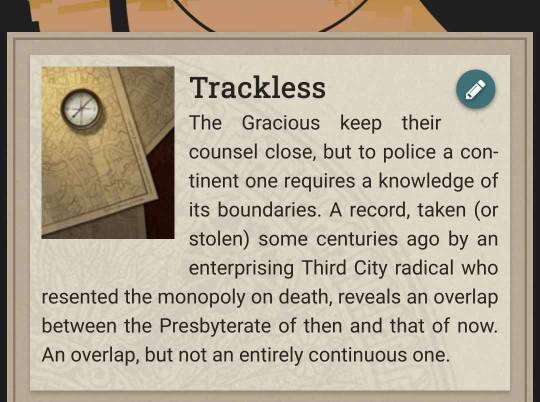
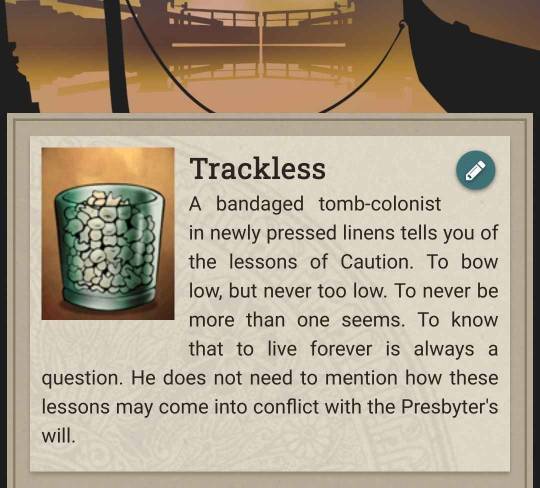
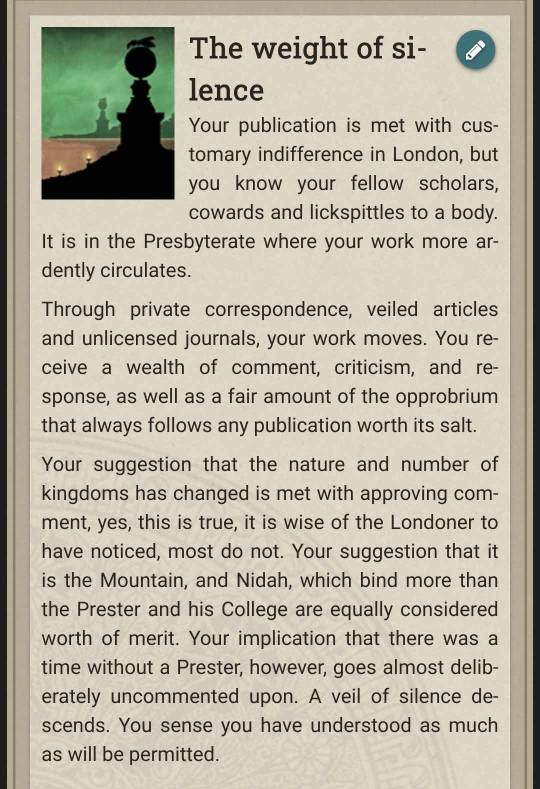
The Presbyterate in a meta sense is based on the legend of Prester John— while FL harkens to this explicitly, I don't think it's a 1:1 relation... but i point it out because fun fact! And maybe still somewhere relevant— a Good Christian King who colonised and united pagan lands into a perfect resplendent kingdom, always said to be real, just undiscovered.
The Prester lives in Nidah, a city which lays on the Mountain of Light— who is the god Stone. Stone is the child of the Bazaar and the Sun, granter of near unconditional immortality to most of the Neath. She dreams of flying in Parabola, and is 'jealous' to see the Avid Horizon open. Within Stone lies the Garden.
We know a number of laws from the Prester, which may or may not be on behalf of Stone. She is worshipped throughout the EC, and may speak through the Prester, but Stone has pretty much never directly communicated anything in FL. none of these statements claim to be from Stone— yet she is the giant shining mountain god looming over all of this. She surely ought to be sacred to the Prester too, right?
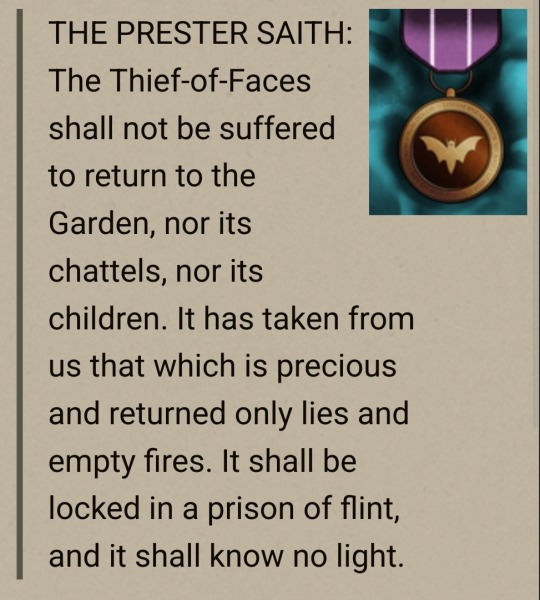
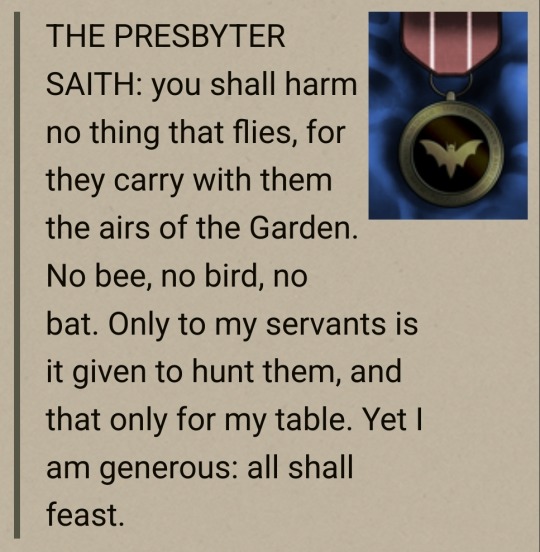
The first one here references the crime the ToF committed against Stone, which notably reads slightly different from the second— "us" vs "I". After the ToF violated her, the Garden was closed off to everyone but flying creatures. The second states that, yet ends with a call for these flying creatures to be eaten. The ones who carry the airs of the Garden. The sacred Garden, closed after a violation of trust, which lies within a god who dreams of flying. (I cannot recall if "flying creatures are sacred to stone" has any further canon source)
Something is wrong. In Evolution, we see the Prester has a ludicrous hunger for all creatures which fly, whether or not they have ever been to the Garden. What the hell is he doing?
THEORIES
The Prester just sucks
This is the most straightforward answer: the Prester abuses his power and does whatever he wants. He twists Stone's laws to suit him, and that's that. Perhaps like Prester John, the Presbyterate is an outside force which has colonised Stone's body and will. Stone has directly intervened before— when the ToF hurt her, when the Queen of Skite freed the ToF, when Parabola opened and she elevated tigers — but hasn't apparently done anything for a long, long time. After she was wounded, maybe she shrunk away, no longer acting despite what horrors the Presbyterate does in her name.
Power corrupts. It can be that simple. Perhaps the first Prester was not malicious, but eventually, with immortality and endless wealth and boredom, power corrupts.
The Prester has good intentions
The Jericho Library stuff contains a number of mysterious hints about the Prester, but I can't put them into any broader understanding yet.
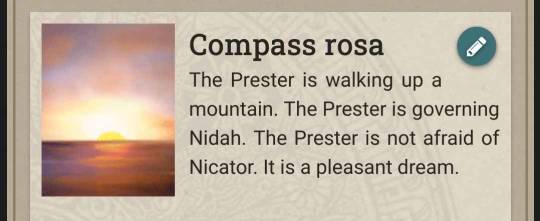
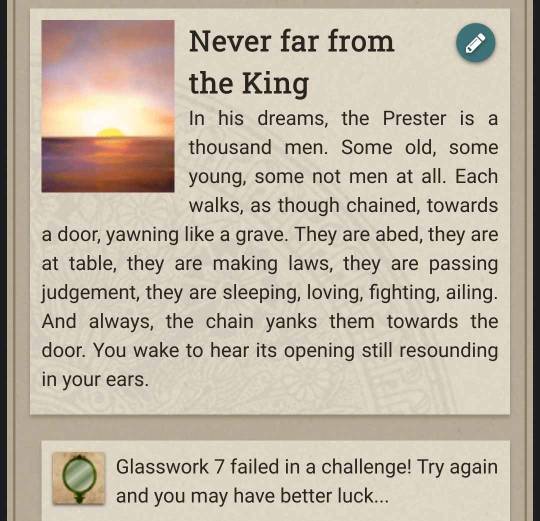
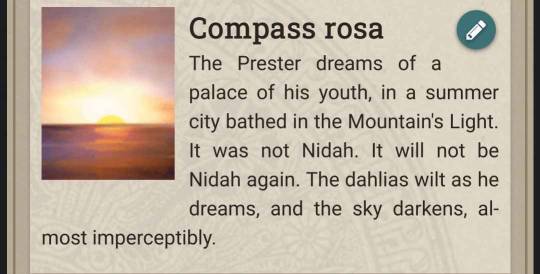
These sound oddly reluctant, struggling, quite against the general image of the Prester as a guy who has mollusc tongue torture devices and eats holy birds. What does it mean? I don't know. Please tell me. But I do think the following could relate to this concept:
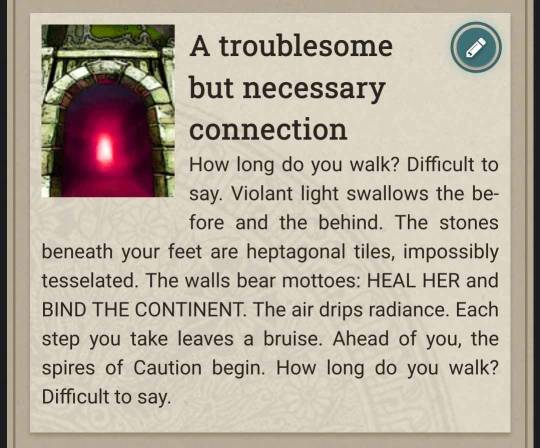
The idea of healing Stone from the wound the ToF caused is only seen once, here. HEAL HER. BIND THE CONTINENT.
Is that what the Presbyterate is, or was? Making kingdoms to bind the land together into one nation, under the rule of those who rule from atop Stone. Perhaps they insist on always having 77, of always existing, of it being her will... as some sort of solution to her pain. This is a mountain who continously bleeds an poisonous blood river out of her womb after a shapeshifter tricked her, made a hateful murder-child out of her body, used it to open the gates of Parabola, and seems to be trying to get the gates of the Avid Horizon opened— to kill her, and everyone in the Neath. No wonder she hasn't been up to much since that happened.
Stone is causing this (accidentally)
Stone dreams of flight. The Prester lives on top of her. this "on" detail was from Arcana ES, and really struck me— because at her peak, Stone is a prismatic, burning, shining half-divine being. Living that close to her light (which is law, or half-law perhaps) CANNOT be good for you. Who knows when and how the Prester came to create Nidah, but after so many eternal years this close to divinity, Stone may be driving them mad.
Wanting, dreaming, yearning, desiring... these are all analogous in Fallen london to hunger. Stone hungers for flight. She dreams of that wish. Could it be her wanting bleeds through her so strongly it has created an insatiable hunger in the Presters for things which fly?
Stone is causing this (on purpose)
See the above, but consider something else.
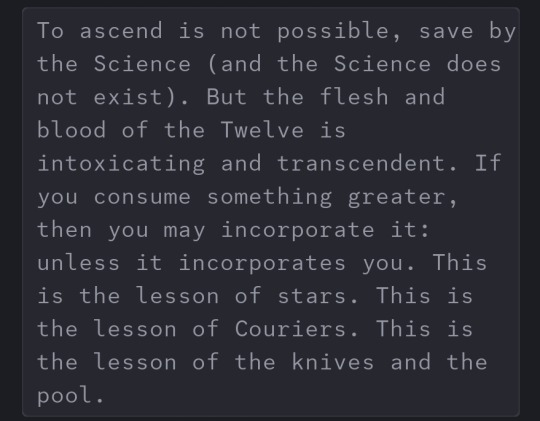
If you consume something greater, you may incorporate it. This is the lesson of stars like her father, of the courier who is her other parent. What if you consume many, many, many lesser things? Is there some essence of flight that could be extracted? If she feeds herself, her servants enough of what she desires, perhaps she can become that which she yearns to be.
#fallen london#fallen london spoilers#theories#stone#my beloved suffering mountain#some thoughts bx#i am constantly throwing my hands up like. what is THE DEAL with the PRESBYTERATE?!?#seriously i aint got a clue#its almost certainly none of this
14 notes
·
View notes
Text
Gauri Abaya Gauri Size If your height is between (m and cm) If your height is between (feet and inches) 52 Below than 1m55 Below than 5’1 54 1m55 and 1m62 5’1 and 5’3 56 1m62 and 1m67 5’3 and 5’5 58 1m67 and 1m72 5’5 and 5’7 60 1m72 and 1m80 5’7 and 5’9 62 More than 1m80 More than 5’9 Features : Composition Nidah Cut Straig Learn more
0 notes
Note

cute lil thing i just found about mr manager
oh man..... The Manager getting into risky endeavours. What were you trying to do there? Presumebly related to the mountain of light I imagine, his goal still the same back then.
intervention from the zee... diamond-hard. I wonder if that means what I think it means....
[im sorry tho i cant get over the fact they named a place Nidah. Niddah is the jewish purity laws around menstruation. eugh XD]
7 notes
·
View notes
Text
this is so cool! i especially love the inclusion of the birds.
as for naming kingdoms, my shot is (left to right in rows): Nidah, Mereid (those two i'm the least sure on), Arbor, Skite, Vesture, Cline, Huz, the Garden(?), Varchas, Grandinia, Caution, and Port Carnelian.
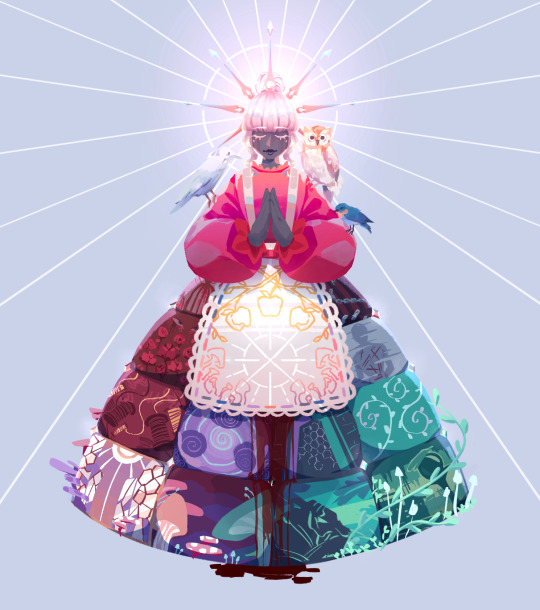
“Hush, now. Lay your head down and rest.”
Stone, The Mountain of Light
140 notes
·
View notes
Photo

Happy birthday to @ablackcatayellowdog! It’s the Angry Death Parrot.
#I really gotta stop forgetting to upload stuff#How to tag???#Uh#Fanart#Nidah#Some Kinda Nonsense#My yellow and black markers are basically dead now#But I'm glad they made this!!
7 notes
·
View notes